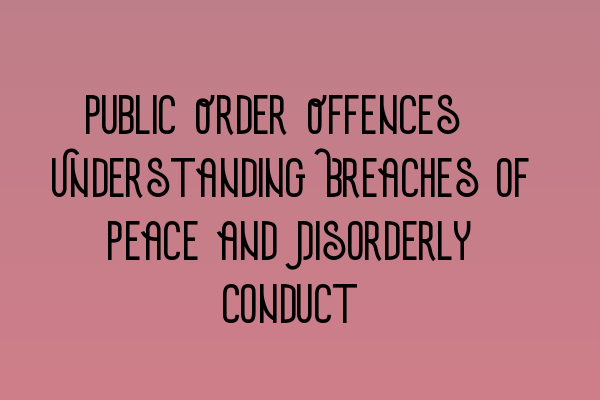Public Order Offences: Understanding Breaches of Peace and Disorderly Conduct
When it comes to public order offences, it is important to have a clear understanding of the law to ensure the protection of individuals and the maintenance of public order. In this article, we will delve into two common public order offences: breaches of peace and disorderly conduct.
Breaches of Peace
A breach of peace occurs when there is a disturbance of public order that causes fear, alarm, or distress to the public. This offence is not limited to physical violence but can also include behavior or actions that disrupt the peace and tranquility of the community. It can occur in public places, residential areas, or even within the confines of a private property if the disturbance is witnessed by the public.
Common examples of breaches of peace include fights, loud and unruly behavior, aggressive language, or threats of violence. It is important to note that a breach of peace does not require actual physical harm to occur, as long as there is evidence that the behavior has caused fear, alarm, or distress to others.
If you find yourself charged with a breach of peace, it is essential to seek legal advice from a qualified solicitor who specializes in criminal law. They can guide you through the legal process, provide representation in court, and help secure the best possible outcome for your case.
Disorderly Conduct
Disorderly conduct refers to engaging in behavior that disrupts the peace and tranquility of a public place. This offence is broader in scope than breaches of peace as it encompasses a wider range of disruptive activities that may not necessarily cause fear, alarm, or distress. Disorderly conduct can include but is not limited to, the following:
- Loud and disruptive behavior
- Intoxication leading to disorderly behavior
- Refusing to comply with a police officer’s instructions
- Engaging in public fights or brawls
- Creating a public disturbance through excessive noise
It is important to note that disorderly conduct is a subjective offence, meaning that the perception of the behavior by the public and law enforcement officers plays a significant role in determining whether an offence has been committed. If you have been charged with disorderly conduct, it is crucial to seek legal representation to effectively present your case and ensure a fair outcome.
Conclusion
Understanding breaches of peace and disorderly conduct is essential to navigate the complex world of public order offences. If you are facing charges related to these offences, it is crucial to consult with a qualified solicitor who can provide expert guidance and representation throughout the legal process.
For more information about the SQE exam, check out our related articles:
- SQE Exam Prep: Essential Study Materials for Aspiring Solicitors
- Demystifying the Solicitors Qualifying Examination Format
- SQE Exam for International Lawyers: Challenges and Success Strategies
- LLC Formation Made Simple: Step-by-Step Guide for UK Entrepreneurs
- LLC Formation: A Step-by-Step Guide for UK Entrepreneurs
